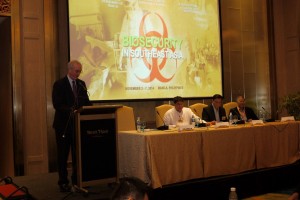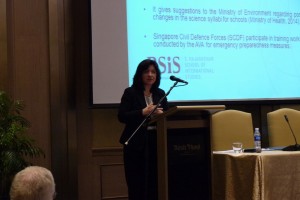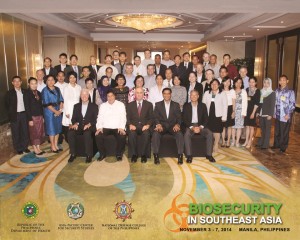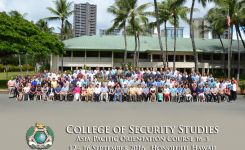- Daniel K. Inouye Asia-Pacific Center for Securi...
- Workshop enhances Southeast Asia Biosecurity Pr...
Workshop enhances Southeast Asia Biosecurity Preparedness
 Reducing Southeast Asia’s biothreat vulnerability was the focus of an international workshop held in Manila, Philippines, Nov. 3-7. The Asia-Pacific Center for Security Studies co-hosted the event, titled “Biosecurity in Southeast Asia,” along with the Philippines Department of Health and National Defense College of the Philippines.
Reducing Southeast Asia’s biothreat vulnerability was the focus of an international workshop held in Manila, Philippines, Nov. 3-7. The Asia-Pacific Center for Security Studies co-hosted the event, titled “Biosecurity in Southeast Asia,” along with the Philippines Department of Health and National Defense College of the Philippines.
The workshop brought together 43 health and security professionals from eight nations and 10 organizations. The group analyzed threats posed by regional pandemics, emerging infectious diseases and bioterrorism activities – all of which can have catastrophic effects on nations’ populations, economies and overall security.
“Biosecurity is a key part of comprehensive security, as the current Ebola outbreak in West Africa clearly demonstrates,” related Brian Goldbeck, U.S. deputy chief of mission in Manila. He added that such transnational threats “impact us all and better policy alignment across the region will make all less vulnerable to these threats. (This) workshop offered a unique opportunity for participants from Southeast Asian nations to collaborate on enhancing regional security.”
Participants developed a list of 21 recommendations for the World Health Organization, according to Dr. Jim Campbell, APCSS workshop academic lead. These proposals should assist Southeast Asia organizations in aligning with international biosecurity norms, and strengthen preparedness and response processes. Recommendations included: improving capacity to mobilize resources; strengthening information sharing; identifying development of a regional collaboration center; and assisting in developing multisectoral pandemic preparedness plans.
Strategy formation benefitted from guided workshop discussions titled “Emerging Biosecurity Threat Environment;” “Preventing and Mitigating Biosecurity Threats;” “Regional and Global Coordination; and, “Communication, Interoperability, and Information Sharing.” The group also analyzed the case study “Ebola: Reconciling International Public Health Obligations with Domestic Health Policy.”
Another focus area was the role of women in biosecurity policy formulation and implementation. Fittingly, the November event included the highest percentage of women participants, 42 percent, to take part in an APCSS program.
 Overall, participants represented an important diversity of expertise.
Overall, participants represented an important diversity of expertise.
Dr. Mely Caballero-Anthony, associate professor and head of the Centre for Non-Traditional Security Studies at Singapore’s Rajaratnam School of International Studies explained, “Biosecurity is not an easy concept to handle…so you really need a wider group of people or experts sensitized to the issue.”
Participants represented Cambodia, Indonesia, Laos, Malaysia, Philippines, Thailand, Timor-Leste and Vietnam. They came from national health, foreign affairs and defense ministries, and national security councils. Subject matter experts came from the Association of Southeast Asian Nations; the Asia-Pacific Economic Cooperation; Asian Development Bank; the Western Pacific Regional Office of WHO; and the South East Asia One Health University Network.
“It was a humbling experience to spend five days with such remarkable professionals as they crafted a unique, whole-of-society strategy to defend their region against Public Health Emergencies of International Concern, said Campbell.”
Dr. Herawati Aru Sudoyo added, “The topic of biosecurity has been considered before, but the way in which it was presented and discussed at this workshop was entirely new, and brought a fresh perspective that was very helpful.” Sudoyo is deputy director at Eijkman Institute of Molecular Biology in Indonesia.
The workshop is one of several APCSS conducts as part of its executive education program. The Center is a Department of Defense institute that addresses regional and global security issues. Military and civilian representatives, most from the United States and Asia-Pacific nations, participate in a comprehensive program of executive education, professional exchanges and outreach events, both in Hawaii and throughout the Asia-Pacific region.
The Center supports the U.S. Pacific Command by developing and sustaining relationships among security practitioners and national security establishments throughout the region. APCSS’ mission is to build capacities and communities of interest by educating, connecting and empowering security practitioners to advance Asia-Pacific security. It is one of the Department of Defense’s five regional security studies centers.
Since opening in 1995, more than 9,100 alumni representing over 122 countries and territories have attended APCSS courses and workshops.


